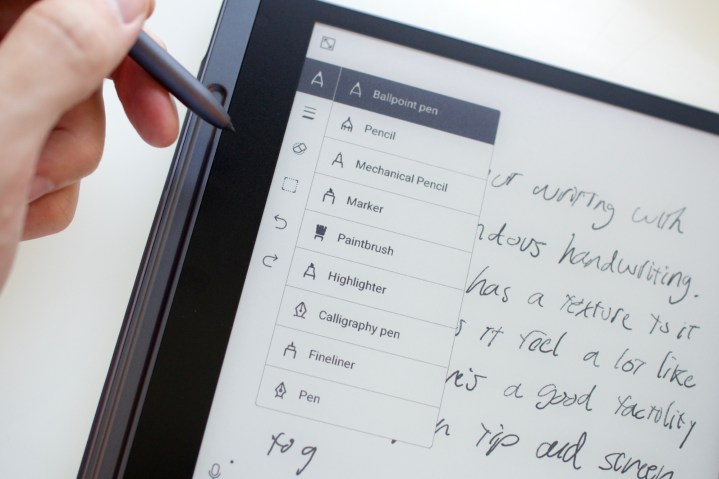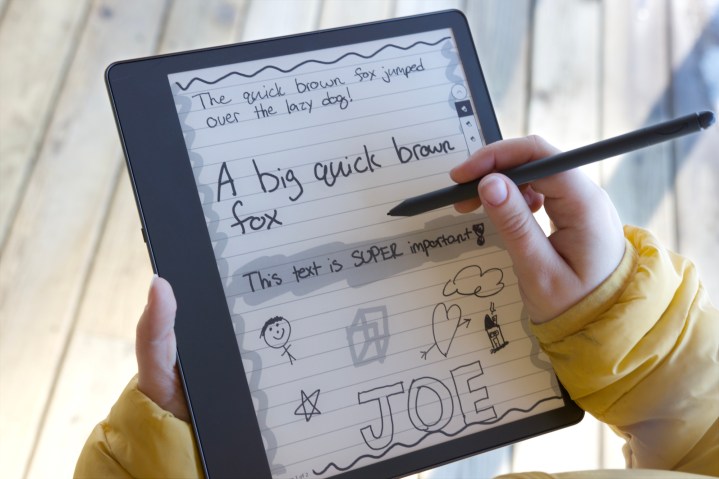CES 2023 happened this week, and it’s usually when we see a bunch of interesting new tech — like Withing’s new health tracker that you pee on, and L’Oreal’s eyebrow printer for your face. Tablets aren’t a huge part of the show, but we still got some interesting options coming from TCL and Lenovo later this year.
Though Apple’s iPad is still the dominant choice in the tablet market, some of the coolest tablets at CES 2023 offer something that Apple doesn’t yet make itself. And that got me thinking; perhaps it’s time for Apple to consider branching out with its tablet lineup to do something new.
Paper-like displays are the way to go
TCL’s Nxtpaper 12 Pro tablet is the one that has really caught my eye, and I’m hoping that Apple creates something similar in the future. With the Nxtpaper 12 Pro, although it uses an LCD display, TCL added multiple layers on the display to give it a paper-like feel, but it also has another benefit: acting as a filter, it can cut down on the blue light exposure while keeping colors as natural as possible, and it also reduces glare.
There’s also another bonus of the TCL Nxtpaper 12 Pro, and that’s a dedicated reading mode. In this reading mode, the screen output is in grayscale, simulating an e-ink display, like a Kindle. Such a mode is beneficial because it’s a more natural reading experience and puts less strain on your eyes.

Apple markets the iPad in multiple ways, but I know that many people use it as a way to read books and other forms of print, as well as a digital notepad or sketchbook with the Apple Pencil. I think Apple could go a long way if it developed a tablet with a display similar to the Nxtpaper 12 Pro. For artists, sketching and drawing on a canvas that feels like paper would feel more natural, and it would cut down on that eye strain after longer sessions. Plus, an anti-glare screen would make it easier to see, especially if you’re outside in the sun.
I’d also love it if Apple had a dedicated “reading mode” on the iPad. Simulating an e-ink display by going grayscale would make it more like reading an actual book, and be easier on the eyes as well. It just sounds like a win-win.
It is definitely a smaller market, but I think having paper-like displays on tablets is a good idea, and honestly, I prefer anti-glare screens over glossy ones anyway. Plus, multi-layer filtering on a display means less blue light exposure, and my terrible eyes would be thankful (I’m staring at a computer screen for most of the day).
Who knows if Apple will ever consider it, but I think there are more benefits to this type of display than there are cons.
Perhaps a digital notepad is really all we need

But another tablet has also caught my eye: Lenovo’s Smart Paper, which is more akin to the Kindle Scribe and reMarkable tablets, but with even more smart features.
The Lenovo Smart Paper is essentially an e-ink tablet that is meant to replace your old-school pen and paper notebook. Its touch display is matte and anti-glare as you’d expect, and the surface feels paper-like, so the Smart Paper Pen that is included will feel no different than, well, an actual pen and paper.
However, the Lenovo Smart Paper has some features that make it stand out from the rest. The Smart Paper Pen has 4,096 levels of pressure sensitivity with 23-millisecond latency and tilt detection. To top it off, the pen also has nine pen settings, including ballpoint, pencil (wooden and mechanical), marker, calligraphy, and more — all completely customizable. The tip of the pen also has a bit of physical resistance, making it feel much more like the thing it’s trying to imitate compared to the competition. And going a step further, Lenovo’s Smart Paper has audio recording capabilities to go with your notes, and you can tap anywhere on a note to play back the audio for context.

Digital Trends’ Mobile Section Editor, Joe Maring, reviewed the Kindle Scribe, and it went from something he didn’t know he needed to something he can’t do without. In fact, here are his thoughts on the Kindle Scribe after continuing to use it on a daily basis:
“I didn’t go into last year expecting the Kindle Scribe to be one of my favorite gadgets in recent memory — but that’s exactly what it’s become. I use the Scribe every single day. It’s what I use to take notes during work meetings, go through my daily to-do list, and read all of my Kindle books.
Having easy access to my Kindle library is great, but the Scribe’s best quality is the note-taking experience. The matte texture of the screen makes it feel like paper. Combined with the e-ink panel and the subtle resistance you get when writing, it creates something that feels like you’re actually using a pencil on real paper; it’s remarkable. The other benefit of e-ink is how inherently limited it is. There’s no opportunity for me to get distracted by Twitter, YouTube, TikTok, or anything else. It’s essentially a smart sheet of paper just for writing, and it’s a concept that works incredibly well.”
I believe that though this may be even more of a niche market, Apple should think about an e-ink iPad down the road. The iPad is already used a lot in education, so an e-ink version that is meant for audio and note-taking wouldn’t be too far off. It could also do something like how the Kindle Scribe lets you put sticky notes (versus scribbling notes all over a book’s pages) in a textbook for things you want to remember later.
Breathing new life into tablets

These days, a lot of tablets, like the upcoming Lenovo Tab Extreme or iPad Pro, are focused more on being complete workhorses and turning your tablet experience into a pseudo-laptop. Though that approach works for some, others have a different purpose in mind for tablets.
I find the idea of using paper-like displays and bringing e-ink to tablets a breath of fresh air. If I wanted a computer-like experience on the go, I would simply use a MacBook Air. I like using tablets for reading, handwriting notes, and even sketching things to convey my ideas better when necessary, so the TCL Nxtpaper 12 Pro and Lenovo Smart Paper are really appealing to me.
Who knows if Apple will ever go this route, but it’s certainly something that it should consider trying. I know I’d buy an iPad “Paper,” because sometimes that’s really all I need.
Editors’ Recommendations


